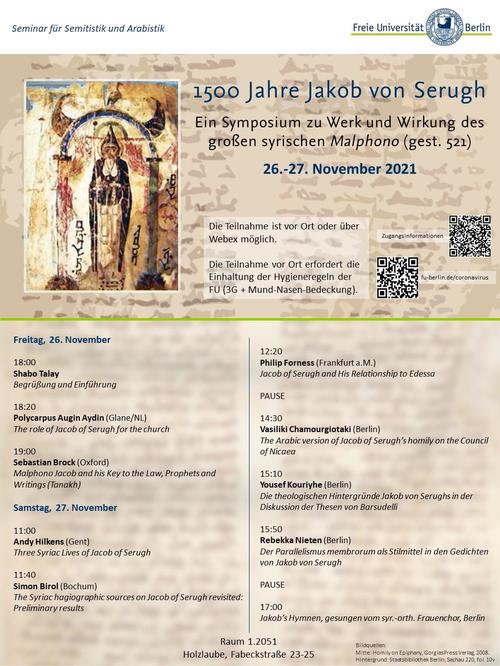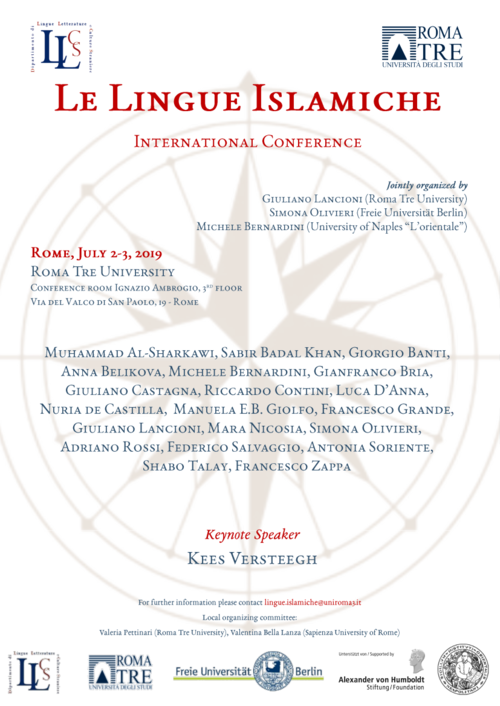Conferences
Conferences 2023
"Following previous Neo-Aramaic conferences in Cambridge, Jerusalem, Warsaw and Uppsala, the international conference, the 5th Neo-Aramaic Languages Conference will take place at Boğaziçi University from October 26th to 27th, 2023. The event is co-organized by the Chair for Semitic Studies of the Freie Universität Berlin and the Department of Linguistics at Boğaziçi University in Istanbul.
The conference serves as a forum of scientific exchange for scholars working on any aspects of the Neo-Aramaic linguistics (North-Eastern Neo-Aramaic, Ṭuroyo/Surayt, Western Neo-Aramaic and Neo-Mandaic), including their contact with neighbouring languages."
The conference is organized by Metin Bağrıaçık (Boğaziçi University) and Shabo Talay (Freie Universität Berlin).
Program Day 1:
October 26th 2023
| 9:00 | Coffee and registration |
| 9:30 |
Welcome and opening remarks Metin Bağrıaçık (Boun) and Shabo Talay (FU Berlin) |
| 10:00 |
Narrative verbal Forms in the NENA dialects Geoffrey Khan (University of Cambridge) |
| 10:30 |
Neo-Aramaic markers of definiteness and indefiniteness: a typological overview in areal perspective Fabio Gasparini (FU Berlin) and Alessandro Mengozzi (University of Turin) |
| 11:00 | Coffee break |
| 11:30 |
Analyzing interborrowings between Modern Eastern Aramaic languages and Classical Syriac Anna Cherkashina (Beth Mardutho: The Syriac Institute / Tel Aviv University) [Online] |
| 12:00 |
High and low ordinals in NENA: historical development or contact induced? Ariel Gutman [Online] |
| 12:30 |
New lexical findings in Ṭyare Neo-Aramaic Hezy Mutzafi (Tel Aviv University) [Online] |
| 13:00 | Lunch break |
| 14:30 |
Verbless and existential clauses in Modern Western Aramaic Anna Bromirskaya and Nikolay Grishin (HSE University Moscow) |
| 15:00 |
Morpho-phonological alternations in Maaloula Aramaic feminine nouns Ghattas Eid and Ingo Plag (Heinrich-Heine-Universität Düsseldorf) |
| 15:30 |
Evidentiality in Modern Western Aramaic Alexey Duntsov (HSE University Moscow) |
| 16:00 | Coffee break |
| 16:30 |
How Arabicized is the Modern Western Aramaic lexicon? Charles G. Häberl (Rutgers University) and Sergey Loesov (HSE Moscow) |
| 17:00 |
On the Periphery Samuel E. Fox |
| 17:30 |
Morpho-phonological analysis of verbs in the Alqoshi Neo-Aramaic Catrin Seepo (University of Florida) |
| 19:30 | Conference Dinner |
Program Day 2:
October 27th 2023
| 9:00 | Coffee |
| 9:30 |
A corpus-based study of word order change in Neo-Aramaic Paul M. Noorlander (University of Cambridge). In collaboration with Geoff Haig and Dorota Molin |
| 10:00 |
What is Central Neo-Aramaic? Shabo Talay (FU Berlin) |
| 10:30 |
The NENA variety of Nudiz Elizaveta Zabelina (RAS Institute for Linguistic Studies, Saint Petersburg) |
| 11:00 | Coffee break |
| 11:30 |
The definite article with proper nouns in Ṭuroyo Sergey Loesov (HSE Moscow) and Charles G. Häberl (Rutgers University) |
| 12:00 |
Adnominal possession marking in Ṭuroyo Ksenia Kashintseva (HSE Moscow) |
| 12:30 |
A finer look at the Christian Urmi verbal stems Elena Shvedova (HSE Moscow) |
| 13:00 | Lunch break |
| 14:30 |
Intransitive clauses in NENA and Qəltu Arabic, and their implications for typology and diachronic change Dorota Molin (University of Cambridge) |
| 15:00 |
Documentation of NENA varieties spoken in Urmiya (Krasnodar Krai, Russia) Kirill Kozhanov (University of Potsdam), Natalia Logvinova (HSE Moscow), Alexey Lyavdansky (HSE Moscow), Maria Ovsjannikova (University of Potsdam), Alina Russkikh (HSE Moscow), Ivan Sarkisov (HSE Moscow), Sergey Say (University of Potsdam), Elena Shvedova (HSE Moscow), Elizaveta Zabelina (RAS Institute for Linguistic Studies, Saint Petersburg) |
| 15:30 |
Linguistic variables in NENA speakers from Urmiya, Krasnodar Krai: A dialectometric study Maria Ovsjannikova and Sergey Say (University of Potsdam) |
| 16:00 | Coffee break |
| 16:30 |
Significant differences in the phonology of glottal consonants between Western Neo-Aramaic and Syrian Arabic Ivri Bunis (University of Haifa) [Online] |
| 17:00 |
Relative clauses in the Neo-Aramaic dialect of Telkepe Eleanor Coghill (Uppsala University) |
| 17:30 |
Crowdsourcing machine learning datasets for Northeastern Neo-Aramaic: groundwork for language revitalization Matthew Nazari (Harvard University & University of Cambridge) |
| 18:00 |
Practical issues in building an Aramaic lexicon: a case study from Syriac with Neo-Aramaic implications George Kiraz (Beth Mardutho: The Syriac Institute / Institute for Advanced Study, Princeton) |
| 18:30 | Closing remarks |
Konferenzen 2021
Freitag, 26.11.2021
| 18:00 |
Shabo Talay Begrüßung und Einführung |
| 18:20 |
Polycarpus Augin Aydin (Glane/NL) „The role of Jacob of Serugh for the church” |
| 19:00 |
Sebastian Brock (Oxford) „Malphono Jacob and his Key to the Law, Prophets and Writings (Tanakh)” |
Samstag, 27.11.2021
| 11:00 |
Andy Hilkens (Gent): „Three Syriac Lives of Jacob of Serugh” |
| 11:40 |
Simon Birol (Bochum): „The Syriac hagiographic sources on Jacob of Serugh revisited: Preliminary results” |
| 12:20 |
Philip Forness (Frankfurt a.M.): „Jacob of Serugh and His Relationship to Edessa“ |
|
PAUSE |
|
|
14:30 |
Vasiliki Chamourgiotaki (Berlin): „The Arabic version of Jacob of Serugh’s homily on the Council of Nicaea“ |
|
15:10 |
Yousef Kouriyhe (Berlin): „Die theologischen Hintergründe Jakob von Serughs in der Diskussion der Thesen von Barsudelli“ |
|
15:50 |
Rebekka Nieten (Berlin): „Der Parallelismus membrorum als Stilmittel in den Gedichten von Jakob von Serugh“ |
| PAUSE | |
| 17:00 | ABGESAGT! Jakob’s Hymnen, gesungen vom syrisch-orthodoxen Frauenchor, Berlin |
Am Freitag, 26.11. ab 16 Uhr bietet PD Dr. Helen Younansardaroud zwei Führungen für jeweils 3-4 Personen durch die Campusbibliothek an.
Conferences 2019
Am 2. und 3. Juli 2019 fand in der Universität Rom III die internationale Konferenz "Le lingue islamiche" statt. Die Veranstaltung wurde organisiert durch Giuliano Lancioni (Fakultät für Fremdsprachen, Literatur und Kultur - Universität Rom III),Simona Olivieri (Seminar für Semitistik und Arabistik - Freie Universität Berlin) und Michele Bernardini (Fakultät für Asien-, Afrika- und Mittelmeerstudien - Universität Neapel "L'Orientale").
Die Konferenz beinhaltete eine Keynote von Kees Verstegh (Emeritus Professor für Arabisch und Islam an der Universität von Nijmegen).
Das neue Forschungsprojekt zum Kitāb Sībawayhi hat eine englische Übersetzung und Analyse des Kitāb zum Ziel und setzt dabei auf eine innovative Herangehensweise, die darüber Aufschluss geben soll, wie das linguistische system des Arabischen von einer der prominentesten Figuren der arabischen linguistischen Tradition beschrieben wurde. Die Übersetzung wird durch eine neuartige Lexikon-basierte Herangehensweise bewerkstelligt, die dahingehend bahnbrechend ist, dass sie - anders als andere Übersetzungen und Arbeiten zu diesem Thema - keine zusätzliche Literatur für die Erklärung von linguitischen Thematiken heranziehen wird und einen klar definierten Corpus frei von nicht-zeitgenössischen Einflüssen ausmachen wird.





